Shelf Life
Before writing essay 1187 on 隅 (corner) this week, I did not expect to find a bumper crop of books with beautiful covers. I can't keep that much beauty to myself, so I'll share several of them with you. I think it's fair to judge these books by their covers, as they're so lovely. At least, I hope it's fair because that's all I have to go on at this point, not having read them!
1. Books About Shelves
Two of the book titles are about shelves! How random!
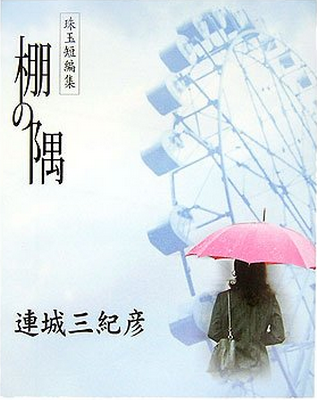
Here we have the cover of a work by Naoki Prize–winning writer 連城三紀彦 (れんじょう みきひこ, in which the last kanji is non-Joyo). He published a 1985 story collection that was reissued in 2007 with the following new title:
「棚の隅」
Corner of a Shelf
棚 (たな: shelf)
That was also the title of one story in the collection. By the way, 隅 has the kun-yomi of すみ here and in all the titles you'll see.
Many of this author's works have been made into movies, and that was true in this case. A film based on the title story came out in 2007 and was called 「棚の隅」 . It depicts the conflicts between a middle-aged man and woman who used to be a couple and who meet again, starting a new life together.
Hmm, I wonder if they share a love of books. Or maybe both people feel that they've been on the shelf too long!
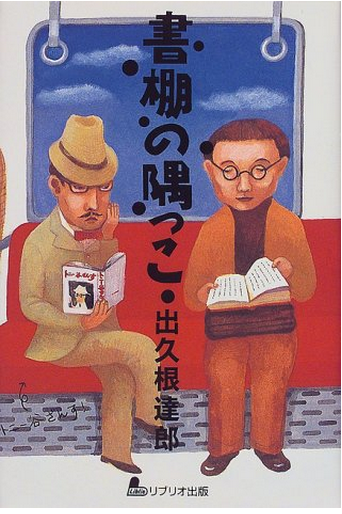
The next shelf-related work appears to be an essay about books that the author highly recommends. The title is as follows (with the keyword meaning "corner"):
「書棚の隅っこ」
Corners of Bookshelves
書棚* (しょだな: bookshelf)
It reflects his idea that the most interesting books lie in the corners of bookshelves (that is, in places you've never considered), rather than at the center. That's what the first sentence of the Amazon product description says, using 片隅 (かたすみ), a third term for "corner":
面白い本は、書棚の中央ではなく、片隅に息をひそめている。
(Really) interesting books lurk at corners of bookshelves, rather than the center.
面白い (おもしろい: interesting); 本 (ほん: book); 中央 (ちゅうおう: center); 息をひそめる (いきをひそめる: to hold one's breath)
I suppose really interesting sentences lie where you'd least expect them, too!
I wondered about the role of the bated breath here. My proofreader figures that the books are so hard to find that it's as if they were holding their breath all this time. He thinks they did that so as not to be found. Two other ideas occur to me; either it was hard to locate the books because they weren't "breathing" and "moving," or they wanted to be found and refused to exhale until they were!
2. Frogs and Other Creatures
Just as two works from the essay are about bookshelves, two more were about frogs, sheerly by coincidence. I eliminated one, but this frog made the cut:
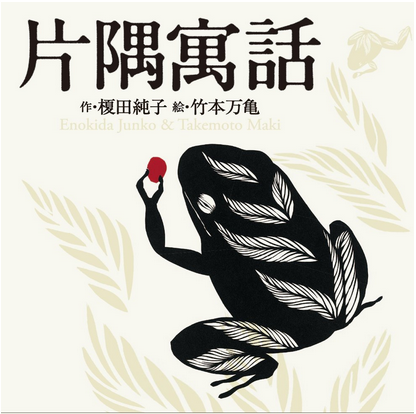
How could he not? I adore this frog! It's an example of 切り絵 (きりえ: cutout art), which is something the book presents in abundance, along with poems and fables.
I'm dying to find out more about 切り絵! ... Okay, now I have! As long as I'm presenting art, I'll share these with you:
• a wonderful example with kanji
• another great one with kanji
• an adorable dog
• a splendid tiger
Oh, I thoroughly enjoyed that detour!
But let me return to the frog book. The remarkable thing about this title is that it puts two look-alikes side by side:
「片隅寓話」
Fables from a Corner (of the World)
寓話 (ぐうわ: fable; allegory)
Even though 隅 and the non-Joyo 寓 share an on-echo of グウ, there is no repetition of that sound because かたすみ is the way to read 片隅. Oh, well!
The 片隅 in the title refers to the corner of Hokkaido, which is where the author lives.
3. Playful Grimness
To look at the playful writing on this cover, you could never begin to guess the topic:
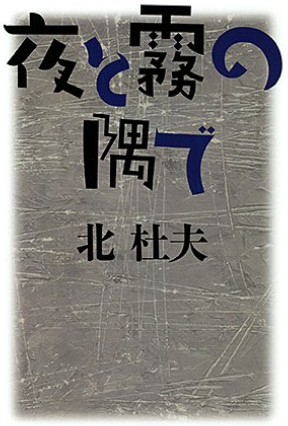
The joyful appearance of this book belies its very grim subject matter. The title of this novel, which earned author 北杜夫 (きた もりお) the 1960 Akutagawa Prize, is as follows:
「夜と霧の隅で」
In the Corner of Night and Fog
夜 (よる: night); 霧 (きり: fog)
As English Wikipedia explains, the book is named for "Night and Fog," the Nazi campaign to eliminate Jews, the mentally ill, and other minorities: "The novel concerns the moral quandary of staff at a German mental hospital during the final years of the 2nd World War. Faced with demands from the SS that the most severely ill patients be segregated for transportation to a special camp, where it is obvious that they will be eliminated, the more morally conscious of the doctors make desperate efforts to protect the patients without outwardly defying the authorities. A parallel theme is the personal tragedy of a young Japanese researcher affiliated with the mental hospital, whose own schizophrenia has been triggered by the disappearance of his half-Jewish wife."
Yikes.
4. Eternal Light
After that you need something cheerful, and this sentence from essay 1187 just might do the trick:
一隅を照らす人になってください。
Please become a person who lights up the corner.
照らす (てらす: to illuminate); 人 (ひと: person)
It features the rare word 一隅 (いちぐう or ひとすみ: corner) and means something like, "You may be in only a corner of the world, but wherever you are, light up that corner." This advice first came from the famous Buddhist priest 最澄 (さいちょう, 767–822), who said that anyone who accomplished this would be a national treasure.
Strangely, I came upon something similar today on Facebook. A new friend, author Marie Mutsuki Mockett, wrote the following status update and was kind enough to let me share it with you:
Today, in the San Francisco Zen Center, we celebrated the anniversary of the Parnirvana—the passing of the Buddha into the final nirvana. The meditation session included each person sitting with her own lit candle in the darkness—it was 5:25 AM. It reminded me that everyone has their own beautiful flame inside.
Among the things the Buddha reportedly said before he passed: "You should rely on self-light, light of self. And you should rely on light of dharma." The "light of the dharma" is the Buddhist teachings that dispel spiritual darkness as a lamp dispels shadow.
Light your lamps.
As long as we're talking about Mockett and books, I'm happy to give her newest work a plug, even though it hardly needs it. Every media outlet from the Los Angeles Times to the New York Times has heaped praise on this memoir of traveling to the devastated Tohoku area while grappling with immense grief about two deaths in her family.
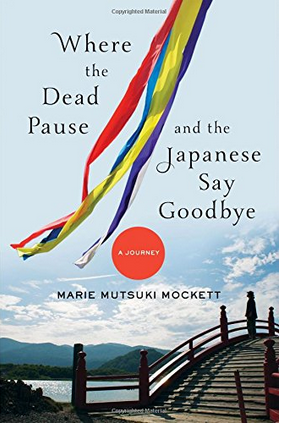
Finally a book in English! As much as I love Japanese, I think I'll start with this one.
If you're looking for something else to read in English (with plenty of Japanese sprinkled in!), check out the newest essay:
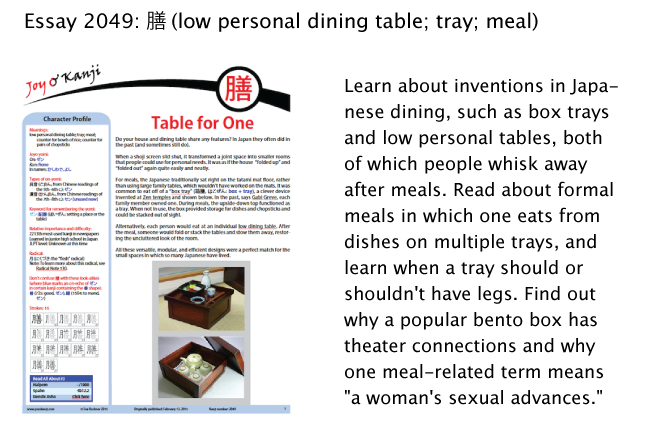
Have a great weekend!

Comments